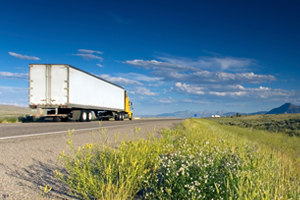
Why We Need Truck Drivers | The Road
Technology allows us to control so much of our lives—we shop, we browse, we research, we buy. We expect convenience and fast delivery regardless of the product we’re ordering or its location. But how do those goods actually get to us? The answer is simple: Truck drivers.
According to the American Trucking Association, truck drivers move 10.5 billion tons of freight in their trucks every year. That’s 287,671 tons each day. It’s difficult for others outside of the industry to comprehend the amount of time it takes to deliver all that truckload freight—the time spent away from home, missing family and friends, all so the products each of us rely on get to where they’re going.
Now driver shortage has been a long-standing conversation for the industry. But what would happen if all of a sudden, all 3.5 million of you weren’t truck drivers anymore? What if every single driver had a different career path?
Immediate impact: Without truck drivers, consumables become severely limited.
Immediate impact: Without truck drivers, consumables become severely limited | The Road
No matter where you live in the United States, a lack of truck drivers would result in losing access to many of your top food choices.
Unless you live in the Midwest, you wouldn’t have access to many staple crops like wheat, corn, or soybeans. And for the most part access to beef would be limited to areas like Texas, California, and a few choice states in the Midwest. And that lobster or shrimp you’ve been craving? Most seafood would be limited to coastal cities.
And tropical fruits like mangos, pineapple, and papaya might not be available in the continental United States at all.
Ripple effect: Without drivers, every aspect of our lives would be affected
Ripple effect: Without drivers, every aspect of our lives would be affected | The Road
The production of many products is limited to certain regions of the United States. A world without truck drivers would make it difficult to get some of the products we all rely on every single day.
Steel mills are heavily concentrated in the eastern third of the United States, which means transporting large steel products to the Midwest and West Coast would become exceedingly difficult without trucks. And getting gas for your car? Probably not unless you’re in the Southwest where most of the domestic crude oil is found. But since most car manufacturing is limited to a few states like Michigan, Illinois, Ohio, and surrounding areas, you might not be able to get that new car anyway.
Wedding and event planners would have to get far more creative since 90% of our flowers are imported and then transported via temperature controlled truck across the country.
What could the future look like without truckload freight?
What could the future look like without truckload freight? | The Road
As we imagine this new world, several unanswerable questions arise:
- How much plane and train infrastructure would be required to support the nation? What about other delivery models (i.e., drones)?
- Would more people grow their own food? What about those in urban areas?
- How would banking react without trucks to move money to different locations? Would it spur an online only system?
- Would people move across the country to be closer to intermodal/air hubs or states that have a wide array of grown and manufactured products?
- How would the job market and unemployment rates change with more than three million additional people hunting for career opportunities?
- How many brands and products would disappear entirely?
The imaginary world that exists without truck drivers is a scary place. Through dedication to truckload transportation, drivers make each of our lives better. Without you, commerce would come to a grinding halt. Thank you truck drivers!



